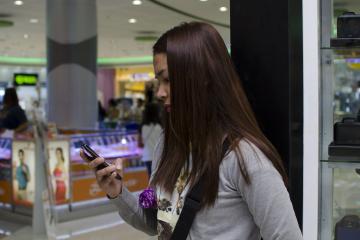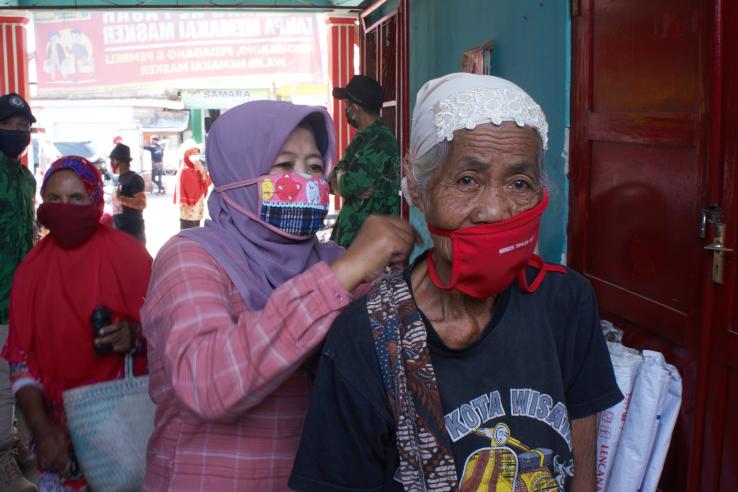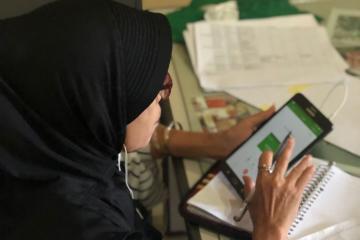
Monitoring the social impact of the COVID-19 pandemic in Indonesia

In the second week of March 2020, Indonesia reported its first case of COVID-19. Since then, the number of COVID-19 cases in the country has been increasing sharply. On October 25, Indonesia reported 350,000 cases, the highest among Southeast Asian countries.
The rapid spread of COVID-19 in Indonesia has wreaked havoc on the economy. Most industrial sectors have been hit hard by the outbreak. Workers in both the formal and informal sectors are losing their jobs. The Government of Indonesia now has the enormous task of formulating policies to mitigate the economic impact of COVID-19.
The outbreak, especially in hotspots like Jakarta and West Java, has also triggered waves of migration to other cities. People have been leaving Jakarta and other big cities in Java to return to their families elsewhere in the country. The decision to migrate is often motivated by job loss, coupled with high costs of living. Given that big cities like Jakarta are currently at the epicenter of the pandemic, migration also increases the risk of an outbreak in the migrants’ destinations.
Concerns about the spread of the virus are further exacerbated by not all Indonesians having sufficient knowledge about the virus or the recommended measures to prevent infection. Preventing the spread of the coronavirus is of the highest concern to the Government of Indonesia, which is rapidly working to develop and implement the appropriate prevention policies.
An online survey to help determine the right policies to mitigate the impact of COVID-19
Considering the rapid spread of the virus and its evolving social and economic consequences, the situation in the field is changing continuously. While the pandemic has pushed the government to take quick and strategic decisions to reach all layers of society and address the crisis, optimal policymaking requires real-time information—which is currently limited. Access to real-time data on the impact of COVID-19 on society and livelihoods will enhance the government’s decision-making capabilities.
At J-PAL SEA, we have been conducting a continuous online survey since April 2020 to provide real-time data on the impact of COVID-19 in Indonesia. We regularly survey 500 Indonesians in each wave, and as of October 5,500 Indonesians have provided information on their situation. Respondents are spread across all provinces in Indonesia, making the data representative and providing wholistic information on the circumstances in Indonesia.
To support the effort by many stakeholders in Indonesia to mitigate the impact of COVID-19, we distribute the results of our survey to our partners, including the Government of Indonesia, NGOs, and leaders in the private sector. The preliminary results of the survey have helped our partners to strategize their next steps.
What are we learning from our online survey?
The survey helped us to provide an early assessment on the socioeconomic repercussions of COVID-19 in Indonesia, focusing on employment, food insecurity, migration, use of government programs, and health knowledge.
Employment and food insecurity
COVID-19 hit employment hard. The survey informed us that as of October 2020, 63 percent of respondents lost their job during the pandemic. This number has been fairly consistent since the survey began and is even higher for those with less education. Moreover, job losses are affecting all sectors, and especially those working in agriculture and health.
Food insecurity remains high since the first wave of the survey. As of October, only 24 percent of households reported eating as much as they should in the last week. However, food security for women, particularly those in rural areas of Kabupaten, is improving significantly.
The rising unemployment numbers reported in the survey are not accompanied by an increase in the use of government programs. Many unemployed people have not yet received government assistance. Only 20 percent of men and 18 percent of women who are not working are enrolled in the social assistance programs BPNT/Sembako or PKH as of October 2020. Fewer people in rural areas of Kabupaten report using any government programs as of October 2020 (including programs such as the Microcredit for Small Medium Enterprise and the Regional Assistance Program).
Migration
Many survey respondents reported that they are migrating during the COVID-19 pandemic. The survey shows that migration levels remained similar across weeks, with 36 percent of men and 32 percent of women reporting having moved since the crisis began. Workers from some sectors are migrating more than others, with 55 percent in the hotel industry, 44 percent of the health industry, and 43 percent of the manufacturing industry migrating.
Knowledge of COVID-19 preventive measures
One of the most important aspects of battling COVID-19 is ensuring that people know which preventive measures should be practiced. From the survey, more men are using masks/sanitizer and more women are reducing gatherings with 10 people or more than at the beginning of the pandemic. Increased handwashing with soap remains the most commonly implemented personal sanitation practice (57 percent), followed by sanitizer or mask use (27 percent) as of October 2020.
Generally, adherence to social distancing guidelines is lagging. Adherence is even lower among young people, with only 13 percent of men under 25 practicing social distancing as of October 2020.
With the infection curve of COVID-19 not showing any indication of flattening, Indonesia will remain in uncertain circumstances. This makes it all the more important to have real-time data—to this end, J-PAL SEA will continue to monitor developments in Indonesia.

